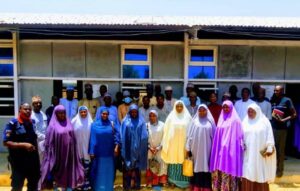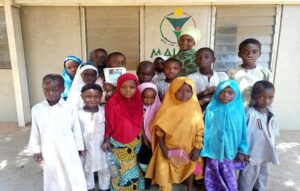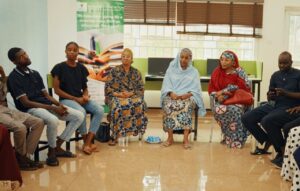The Centre of Qur’anic Reciters, Nigeria, led by Shugaba Gwani Hassan Musa from Mina, paid a courtesy visit to Mallpai Foundation’s headquarters in Abuja, discussing key issues surrounding the welfare and educational empowerment of Almajiri children across Nigeria. The high-level dialogue centered on pressing matters, including the reformation of Tsangaya (Almajiri) schools, integrating basic literacy and vocational skills, discouraging street begging in the name of Almajirci, and advancing school enrollment for out-of-school children.
In her welcome remarks, Hajiya Aisha Atiku Bagudu, Founder/CEO of Mallpai Foundation, expressed her admiration for the Centre’s advocacy and longstanding commitment to Qur’anic education. She highlighted Mallpai Foundation’s ongoing initiatives in promoting quality education and skills acquisition for vulnerable children. “Our foundation is committed to a future where Almajiri children are not only literate but also equipped with skills that will empower them for life beyond the Tsangaya system,” she stated.
Representatives of the Centre of Qur’anic Reciters underscored the need to modernize the Tsangaya schools, integrating essential literacy and numeracy alongside Qur’anic teachings. Secretary Gwani Yasir Abdullahi Dalla Dalla from Gusau stressed, “To transform the future of these young ones, it is critical we reform the Almajiri system to blend religious and formal education so they can thrive in society.”
Public Relations Officer Abdulkadir Muhammad Adam from Kano spoke on the damaging effects of child street begging in the name of Almajirci. He called for a collective stance against this practice, promoting a dignified approach to Qur’anic education that shields children from exploitation and restores the true essence of Almajiri culture.
Representing Mallpai Foundation, Habib Sani, Program Officer, outlined the organization’s strategic initiatives aimed at school enrollment drives and the establishment of literacy support centers across Northern Nigeria. “It’s time we fully realize the potential of the Almajiri children by giving them access to formal education, basic life skills, and vocational training,” he remarked. Maryam Ide Usman echoed this, emphasizing the foundation’s efforts in creating sustainable solutions to address the challenges facing out-of-school children and underserved communities.
The event concluded with a mutual commitment to pursue actionable policies and joint programs, fostering a progressive reformation of the Almajiri system and enhancing the educational inclusion of marginalized children. Both organizations pledged to explore avenues of collaboration to advance the integration of literacy and skills training in Tsangaya schools, aiming for a brighter future for Nigeria’s youth.






